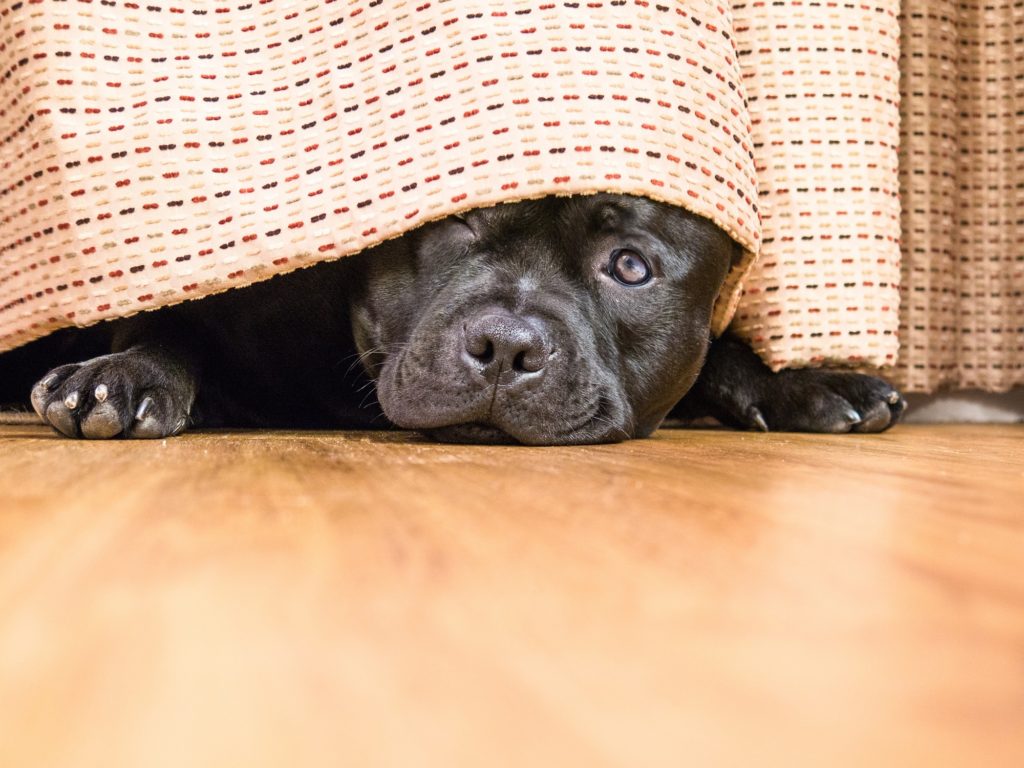Living with a thunderstorm phobic dog can be very difficult. One of our family dogs was desperately afraid of thunder and after a thunderstorm we would find her either amongst my shoes in the wardrobe or more often in the bathroom, curled up between the bath and the toilet. Thankfully, she never destroyed anything, nor did she try to escape.

Attempts to escape can be extreme, some dogs have been known to jump out of windows in sheer panic, probably because there is nothing they can do to avoid the effects of a thunderstorm. In addition to the classic signs of anxiety –drooling, pacing and trembling -thunder phobic dogs can display several behaviours, such as hiding in confined places and bathrooms, whining or howling and destructive behaviour generally located round windows and doors and other exits. We need to remember that these dogs are not being deliberately naughty, they are genuinely traumatised and need our understanding and support.
So, what can we do to help? Before looking at ways to treat the problem we need to look a what happens in a thunderstorm. Storms are often preceded by changes in barometric pressure and low frequency rumbles, both of which can be detected by dogs but not humans. This explains why some thunder phobic dogs may become agitated well before a storm occurs. As the storm approaches there is a build-up of static electricity, the wind may change followed by the usual flashes of lightning, claps of thunder and torrential rain, all of which combined can trigger a classic panic response in a dog.
So, thunderstorms are multi faceted, and desensitisation techniques are unlikely to help if the dog is fearful of all aspects of a storm. There are some excellent sound cd’s available with sounds of thunder claps, the sound of heavy rain and the sound of the wind, and for dogs which only appear to become fearful after the first loud clap of thunder and do not become agitated prior to a storm then desensitisation coupled with counter conditioning will undoubtedly help. But what about the dogs which are acutely phobic and become anxious prior to a storm, how can we help them?
Firstly, we need to look at what may be triggering their fear. Other than lightning, thunder and rain, the other components of a thunderstorm are changes in barometric pressure, low frequency rumbles and a build-up of static electricity and the key is possibly the build-up of static electricity.
A dog’s coat is a perfect place for static electricity to build up and dogs may be receiving random shocks during a thunderstorm. The inability to escape/avoid being shocked will be terrifying and could be associated with being in the house. Hence the destruction around doors and windows (an effort to escape) or complete panic and actual escape through windows for example. This is further compounded by the fact that many truly phobic dogs find solace in the bathroom just as my old dog did. The proximity of water enables the build up of static electricity to be grounded and therefore prevents the dog being randomly shocked.
So, what is the best course of action? Firstly, we need to provide a ‘den’ for the dog and this is where a sound cd will be very useful. Even if the dog is one that reacts before a storm arrives, we can teach the dog to run to a den when a thunder clap happens and praise and cuddle him/her in the den. That way the dog will have a place of safety to run to and hide and this should always be accessible for the dog. A den could be the cupboard under the stairs, a crate covered with blankets, under the bed, in a wardrobe…the list is endless, and those dogs which seek out sources of electrical grounding sites, the den should be in the bathroom, downstairs toilet, next to the washing machine, in fact anywhere close to water.
Interestingly, the very aptly named Thundershirt (and other wraps) may have anti-static properties and therefore may help to reduce static shocks as well as having anti-anxiety effects through the gentle, constant calming pressure.
Finally, there are some excellent anxiolytic medications available so if you cannot bear to see the debilitating effects on your dog during a thunderstorm, make an appointment with your veterinarian to discuss what medication may help.


